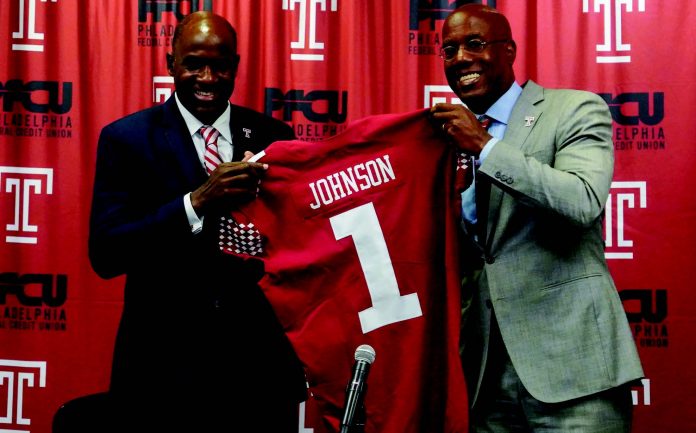PHILADELPHIA (AP) — In the past year, Temple has hired a new president, athletic director, and football coach, all Black men.
The moves have made Temple just the second school that plays major college football to have an African-American in all three of those high-profile positions, along with Maryland.
Temple is also the only school among 131 that compete at the highest level of Division I to have Black people leading the university, the athletic department, the football program, and both the men’s and women’s basketball programs.
Temple’s choices were not planned, but they were also more than a coincidence, university president Jason Wingard said.
“It was no more intentional than it is the other way around,” Wingard said, referring to the far more common occurrence in big-time college sports of a white man hiring another white man.
Much like the NFL, major college football has struggled to address the dearth of Blackhead football coaches in a sport where the majority of the players are Black. According to the most recent data compiled by the NCAA, 45% of football players in Power Five conferences during the 2020-21 season were black, and 37% were white. In the five other FBS conferences, 51% percent of the players were black and 33% white.
Just 10% of the head coaches were Black, and 82% were white. Ten years ago, 14% of FBS head coaches were Black. New Temple coach Stan Drayton is one of 15 Blackhead coaches currently set to start next season at 131 FBS schools.
When talk turns to growing those numbers, the focus is often on the pipeline leading to the head coach’s office and trying to raise the profiles of Black assistant coaches. Maryland coach Mike Locksley’s National Coalition of Minority Football Coaches is trying to lead the way in those areas.
Just as important, Wingard said, is the trickle-down effect that comes from having more diversity among those who are ultimately making those hires — the athletic directors and university presidents.
“I don’t call you or anybody else racist, but we have experiences, and we have biases based on those experiences. And so we tend to all be more attracted to work better with people who are like us and who have shared those experiences,” said Wingard, who wrote an op-ed about the subject after former Miami Dolphins coach Brian Flores sued the NFL and several teams for discrimination.
“So representation matters,” Wingard added, “because when you have a variety of people as college presidents, when you have women when you have African-Americans when you have Latinos and Asian- Americans, then their experiences are going to bring — around them — differences.”
Wingard became Temple’s first Black president last June. In October, he filled Temple’s long-vacant AD position by hiring Arthur Johnson, whose career as an athletic administrator spans 20 years and includes lengthy stints at Texas and Georgia.
“This business is about relationships,” Johnson said. “So who are people most comfortable with?”
Drayton, 51, is a first-time head coach after a long career as an assistant in the NFL and some of the highest-profile programs in college football, such as Ohio State and Texas.
Drayton’s previous experience in the Philadelphia area as a college coach early in his career went a long way in helping land him the job, along with some strong recommendations from those he had worked with previously, Johnson said. He noted the two did not work closely together at Texas.
Johnson is one of 19 Black athletic directors among FBS schools. His longtime friend, Maryland AD Damon Evans, is one of the others.
Evans said advocacy plays a huge role in who is hired. Locksley’s coalition has tried to foster professional relationships between up-and-coming Black coaches and college sports administrators as a way of creating more advocates. Evans said more Black leaders should lead to more advocacy for Black candidates.
“You tend to be more in touch, let’s just be candid, with individuals that may look like you or come from your same race, ethnicity, or what have you. And also to be more in tune and more aware,” Evans said.
“We have to pay it forward,” he added.
Drayton said he was proud to be part of a rare leadership group in college sports. That it would be assembled at Temple, an urban university in North Philadelphia that counts late Hall of Fame men’s basketball coach John Chaney as one of its most influential figures seems appropriate.
“It is a very significant time here at Temple, and it’s a very significant action by the powers that be here at Temple to put this type of leadership in place,” Drayton said. “And it makes sense.”
Follow Ralph D. Russo at https://twitter.com/ralphDrussoAP and listen at http://www.appodcasts.com


